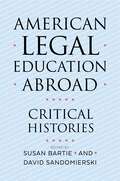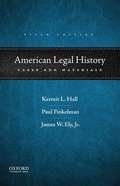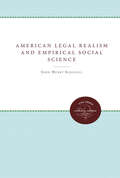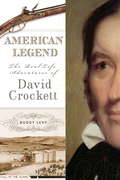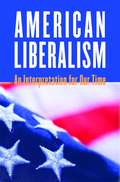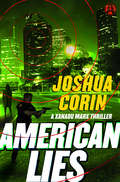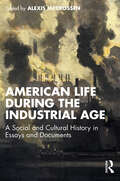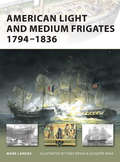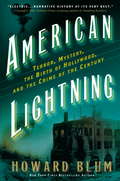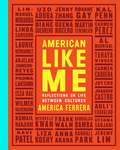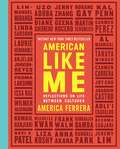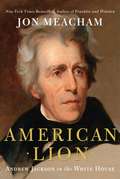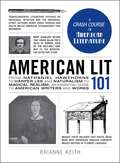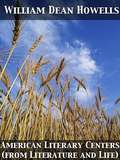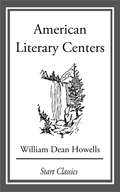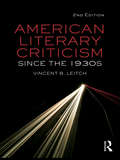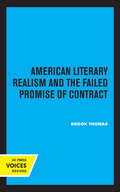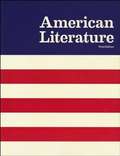- Table View
- List View
American Legal Education Abroad: Critical Histories
by Susan Bartie David SandomierskiA critical history of the Americanization of legal education in fourteen countriesThe second half of the twentieth century witnessed the export of American power—both hard and soft—throughout the world. What role did US cultural and economic imperialism play in legal education? American Legal Education Abroad offers an unprecedented and surprising picture of the history of legal education in fourteen countries beyond the United States.Each study in this book represents a critical history of the Americanization of legal education, reexamining prevailing narratives of exportation, transplantation, and imperialism. Collectively, these studies challenge the conventional wisdom that American ideas and practices have dominated globally. Editors Susan Bartie and David Sandomierski and their contributors suggest that to understand legal education and to respond thoughtfully to the mounting present-day challenges, it is essential to look beyond a particular region and consider not only the ideas behind legal education but also the broader historical, political, and cultural factors that have shaped them.American Legal Education Abroad begins with an important foundational history by leading Harvard Law School historian Bruce Kimball, who explains the factors that created a transportable American legal model, and the book concludes with reflections from two prominent American law professors, Susan Carle and Bob Gordon, whose observations on recent disruptions within US law schools suggest that their influence within the global order of legal education may soon fall into further decline. This book should be considered an invaluable resource for anyone in the field of law.
American Legal History: Cases and Materials (Fifth Edition)
by Paul Finkelman James W. Ely Kermit L. HallThis highly acclaimed text provides a comprehensive selection of the most important documents in American legal history, integrating the history of public and private law from America's colonial origins to the present. Devoting special attention to the interaction of social and legal change, American Legal History: Cases and Materials, Fifth Edition, shows how legal ideas developed in tandem with specific historical events and reveals a rich legal culture unique to America. The book also deals with state and federal courts and looks at the relationship between the development of American society, politics, and economy and how it relates to the evolution of American law. Introductions and instructive headnotes accompany each document, tying legal developments to broader historical themes and providing a social and political context essential to an understanding of the history of law in America. Setting the legal challenges of the twenty-first century in a broad context, American Legal History, Fifth Edition, is an indispensable text for students and teachers of constitutional and legal history, the judicial process, and the effects of society on law.
American Legal Realism and Empirical Social Science (Studies in Legal History)
by John Henry SchlegelJohn Henry Schlegel recovers a largely ignored aspect of American Legal Realism, a movement in legal thought in the 1920s and 1930s that sought to bring the modern notion of empirical science into the study and teaching of law. In this book, he explores individual Realist scholars' efforts to challenge the received notion that the study of law was primarily a matter of learning rules and how to manipulate them. He argues that empirical research was integral to Legal Realism, and he explores why this kind of research did not, finally, become a part of American law school curricula. Schlegel reviews the work of several prominent Realists but concentrates on the writings of Walter Wheeler Cook, Underhill Moore, and Charles E. Clark. He reveals how their interest in empirical research was a product of their personal and professional circumstances and demonstrates the influence of John Dewey's ideas on the expression of that interest. According to Schlegel, competing understandings of the role of empirical inquiry contributed to the slow decline of this kind of research by professors of law.Originally published in 1995.A UNC Press Enduring Edition -- UNC Press Enduring Editions use the latest in digital technology to make available again books from our distinguished backlist that were previously out of print. These editions are published unaltered from the original, and are presented in affordable paperback formats, bringing readers both historical and cultural value.
American Legend: The Real-Life Adventures of David Crockett
by Buddy LevyDavid Crockett was an adventurer, a pioneer, and a tragic hero who died at the Alamo. But the life of the real Crockett has been largely obscured and overshadowed by his mythology, turning this honest, unassuming backwoodsman into a larger-than-life, Disney-fied character in a coonskin cap. <P> In his short but distinguished lifetime, Crockett became America's original celebrity, frequently written about in newspapers and becoming an integral part of the folklore of his day. Opportunistic and clever, and presciently media-savvy, Crockett parlayed his humble origins to his advantage, using his charismatic frontiersman persona to win elections as a three-time U.S. Congressman and even a nomination as presidential candidate. The 1834 publication of his memoir, A Narrative of the Life of David Crockett-by Himself, one of the first autobiographies of its kind, went through seven printings, and sent Crockett on the first-ever book tour across the Eastern seaboard. <P> At heart, Crockett was unassuming and down-to-earth, obstinate and independent to a fault. In a beautifully descriptive narrative, American Legend takes readers from Crockett's childhood hardships, near-death experiences, and meager education through his unlikely rise to Congress. Though his death at the Alamo on March 6, 1836, only added to his considerable fame and notoriety, the common David Crockett emerges here as never before: a rugged individual, an American original, and an enduring symbol of the American spirit
American Liberalism
by John McgowanAmericans live in a liberal democracy. Yet, although democracy is widely touted today, liberalism is scorned by both the right and the left. The United States stands poised between its liberal democratic tradition and the illiberal alternatives of liberalism's critics. John McGowan argues that Americans should think twice before jettisoning the liberalism that guided American politics from James Madison to the New Deal and the Great Society. In an engaging and informative discussion, McGowan offers a ringing endorsement of American liberalism's basic principles, values, and commitments. He identifies five tenets of liberalism: a commitment to liberty and equality, trust in a constitutionally established rule of law, a conviction that modern societies are irreducibly plural, the promotion of a diverse civil society, and a reliance on public debate and deliberation to influence others' opinions and actions.McGowan explains how America's founders rejected the simplistic notion that government or society is necessarily oppressive. They were, however, acutely aware of the danger of tyranny. The liberalism of the founders distributed power widely in order to limit the power any one entity could exercise over others. Their aim was to provide for all an effective freedom that combined the right to self-determination with the ability to achieve one's self-chosen goals. In tracing this history, McGowan offers a clear vision of liberalism's foundational values as America's best guarantee today of liberty and the peace in which to exercise it.What are the basic values and commitments of American liberals? John McGowan sets out to answer that question in this lively and provocative book. Tracing a tradition that extends from James Madison through Franklin Delano Roosevelt to today, McGowan emphasizes liberalism's distribution of power throughout society in order to secure freedom and equality. Liberals locate the effort to achieve legal, political, and social equality as central to securing a just and stable society. They also insist that only an "effective" freedom that includes the capacity to achieve one's self-chosen goals deserves the name of liberty. By presenting the history of the much-contested values of freedom, equality, and social justice, McGowan offers a clear vision of liberalism's ambitious and inspiring vision for these United States.-->
American Lies: A Xanadu Marx Thriller (Xanadu Marx #3)
by Joshua CorinFor wild-card ex-FBI agent Xanadu Marx, the war on terror hits close to home—thanks to a remorseless enemy who’s all too familiar—in this explosive thriller. “Joshua Corin is a master storyteller.”—Douglas Preston, #1 bestselling co-creator of the Pendergast novels It begins on a beautiful day in Atlanta, with a mosque full of Muslim worshippers celebrating the end of Ramadan. The festivities are cut brutally short when a military drone appears in the sky—and launches a missile into the building. Then, at a mosque in Dearborn, Michigan, another peaceful gathering is torn apart by the violent blast of a suicide bomber. The attacks set the entire nation on edge, with authorities scrambling to make sense of the situation and keep the populace calm while pundits and politicians of all stripes fight for time in the spotlight. But for ex-FBI agent Xanadu Marx, her first instinct is revenge. Unwilling to let such savagery go unanswered, she plunges into the investigation the police have started—but only she can finish. Disregarding official warnings from the government and outright threats from others, she follows a trail of homegrown hatred and violence to uncover a conspiracy so cold-blooded that no one will believe her—even if she lives long enough to tell. . . .
American Life During the Industrial Age: A Social and Cultural History in Essays and Documents
by Alexis McCrossenThis volume explores the Industrial Age (1860–1914), bringing together published and archival primary sources with introductory essays that contextualize a period of extraordinary social, cultural, and economic transformation.The Industrial Age’s developments, which included electricity, internal-combustion engines, moving assembly lines, and clock time, posed as much risk and opportunity as do today’s innovations. Today artificial intelligence, terrorism, climate change, and the threat of pandemics like Covid-19 threaten our safety and sense of well-being, just as machine production, the labor movement, toxic chemicals and waste, and epidemics like tuberculosis and cholera posed significant challenges in the Industrial Age. This modern and innovative collection features tried and tested topics, such as immigration and labor, along with underexplored ones, such as electricity, abundance, and contaminants. Each chapter includes a historiographical essay exploring the rich historical and sociological scholarship on the period in the United States, while framing the documents and illustrations included in the chapter. American Life During the Industrial Age is an ideal companion to undergraduate and graduate courses in United States history, American studies, the history of technology, and the history of culture and society.
American Light and Medium Frigates 1794-1836
by Tony Bryan Mark LardasThe "Original Six" frigates were commissioned by the new-born US Navy at a staggering cost of $688,888.82. Designed to be light and fast, these warships enabled America to project its power across the globe. Among the ships Mark Lardas examines is USS Constellation: the first ship to be commissioned by the United States Navy, and also the first ship to engage and capture an enemy vessel, the French L'Insurgente - this engagement is vividly portrayed in original color artwork. The fascinating history of the USS Chesapeake is also brought to life through the dramatic account one of the bloodiest duels in the age of fighting sail as the Chesapeake meets the British frigate Shannon and is overwhelmed, the dying cry of the captain, "Don't give up the ship!" inspired the US Navy thereafter. Alongside stirring accounts of engagements during the Barbary Wars and the Quasi-War, the author explores the design and development of these frigates, explaining the shortcomings that led to their replacement by larger, heavier 44-gun models by 1800. Contemporary illustrations of US frigates and their British and French rivals help to place these ships in the context of European ship design, clearly showing the escalation of the naval 'arms race' during the seventeenth century. American Light and Medium Frigates is an ideal resource for any naval enthusiast wanting to learn more about the ships that witnessed the rise of the US Navy and Marines.
American Lightning
by Howard BlumIt was an explosion that reverberated across the country--and into the very heart of early-twentieth-century America. On the morning of October 1, 1910, the walls of the Los Angeles Times Building buckled as a thunderous detonation sent men, machinery, and mortar rocketing into the night air. When at last the wreckage had been sifted and the hospital triage units consulted, twenty-one people were declared dead and dozens more injured. But as it turned out, this was just a prelude to the devastation that was to come.In American Lightning, acclaimed author Howard Blum masterfully evokes the incredible circumstances that led to the original "crime of the century"--and an aftermath more dramatic than even the crime itself. With smoke still wafting up from the charred ruins, the city's mayor reacts with undisguised excitement when he learns of the arrival, only that morning, of America's greatest detective, William J. Burns, a former Secret Service man who has been likened to Sherlock Holmes. Surely Burns, already world famous for cracking unsolvable crimes and for his elaborate disguises, can run the perpetrators to ground. Through the work of many months, snowbound stakeouts, and brilliant forensic sleuthing, the great investigator finally identifies the men he believes are responsible for so much destruction. Stunningly, Burns accuses the men--labor activists with an apparent grudge against the Los Angeles Times's fiercely anti-union owner--of not just one heinous deed but of being part of a terror wave involving hundreds of bombings. While preparation is laid for America's highest profile trial ever--and the forces of labor and capital wage hand-to-hand combat in the streets--two other notable figures are swept into the drama: industry-shaping filmmaker D.W. Griffith, who perceives in these events the possibility of great art and who will go on to alchemize his observations into the landmark film The Birth of a Nation; and crusading lawyer Clarence Darrow, committed to lend his eloquence to the defendants, though he will be driven to thoughts of suicide before events have fully played out.Simultaneously offering the absorbing reading experience of a can't-put-it-down thriller and the perception-altering resonance of a story whose reverberations continue even today, American Lightning is a masterpiece of narrative nonfiction.From the Hardcover edition.
American Lightning
by Howard BlumIt was an explosion that reverberated across the country--and into the very heart of early-twentieth-century America. On the morning of October 1, 1910, the walls of the Los Angeles Times Building buckled as a thunderous detonation sent men, machinery, and mortar rocketing into the night air. When at last the wreckage had been sifted and the hospital triage units consulted, twenty-one people were declared dead and dozens more injured. But as it turned out, this was just a prelude to the devastation that was to come.In American Lightning, acclaimed author Howard Blum masterfully evokes the incredible circumstances that led to the original "crime of the century"--and an aftermath more dramatic than even the crime itself. With smoke still wafting up from the charred ruins, the city's mayor reacts with undisguised excitement when he learns of the arrival, only that morning, of America's greatest detective, William J. Burns, a former Secret Service man who has been likened to Sherlock Holmes. Surely Burns, already world famous for cracking unsolvable crimes and for his elaborate disguises, can run the perpetrators to ground. Through the work of many months, snowbound stakeouts, and brilliant forensic sleuthing, the great investigator finally identifies the men he believes are responsible for so much destruction. Stunningly, Burns accuses the men--labor activists with an apparent grudge against the Los Angeles Times's fiercely anti-union owner--of not just one heinous deed but of being part of a terror wave involving hundreds of bombings. While preparation is laid for America's highest profile trial ever--and the forces of labor and capital wage hand-to-hand combat in the streets--two other notable figures are swept into the drama: industry-shaping filmmaker D.W. Griffith, who perceives in these events the possibility of great art and who will go on to alchemize his observations into the landmark film The Birth of a Nation; and crusading lawyer Clarence Darrow, committed to lend his eloquence to the defendants, though he will be driven to thoughts of suicide before events have fully played out.Simultaneously offering the absorbing reading experience of a can't-put-it-down thriller and the perception-altering resonance of a story whose reverberations continue even today, American Lightning is a masterpiece of narrative nonfiction.From the Hardcover edition.
American Lightning: Terror, Mystery, and the Birth of Hollywood
by Howard BlumIt was an explosion that reverberated across the country--and into the very heart of early-twentieth-century America. On the morning of October 1, 1910, the walls of the Los Angeles Times Building buckled as a thunderous detonation sent men, machinery, and mortar rocketing into the night air. When at last the wreckage had been sifted and the hospital triage units consulted, twenty-one people were declared dead and dozens more injured. But as it turned out, this was just a prelude to the devastation that was to come. In American Lightning, acclaimed author Howard Blum masterfully evokes the incredible circumstances that led to the original "crime of the century"--and an aftermath more dramatic than even the crime itself. With smoke still wafting up from the charred ruins, the city's mayor reacts with undisguised excitement when he learns of the arrival, only that morning, of America's greatest detective, William J. Burns, a former Secret Service man who has been likened to Sherlock Holmes. Surely Burns, already world famous for cracking unsolvable crimes and for his elaborate disguises, can run the perpetrators to ground. Through the work of many months, snowbound stakeouts, and brilliant forensic sleuthing, the great investigator finally identifies the men he believes are responsible for so much destruction. Stunningly, Burns accuses the men--labor activists with an apparent grudge against the Los Angeles Times' fiercely anti-union owner--of not just one heinous deed but of being part of a terror wave involving hundreds of bombings. While preparation is laid for America's highest profile trial ever--and the forces of labor and capital wage hand-to-hand combat in the streets--two other notable figures are swept into the drama: industry-shaping Filmmaker D. W. Griffith, who perceives in these events the possibility of great art and who will go on to alchemize his observations into the landmark film The Birth of a Nation; and crusading lawyer Clarence Darrow, committed to lend his eloquence to the defendants, though he will be driven to thoughts of suicide before events have fully played out. Simultaneously offering the absorbing reading experience of a can't-put-it-down thriller and the perception-altering resonance of a story whose reverberations continue even today, American Lightning is a masterpiece of narrative nonfiction.
American Like Me: Reflections on Life Between Cultures
by America FerreraAn emotionally and politically charged collection of first person accounts from prominent citizens in a variety of fields about their experiences being first generation Americans, with a powerful foreword written by actress and activist America Ferrera. From award-winning actress and political activist America Ferrera comes an absorbing and fascinating collection of essays written by prominent Americans from a variety of fields about their experiences being first generation Americans. As the daughter of Honduran immigrants, Ferrara is enthusiastic to share dozens of personal stories from notable actors, comedians, athletes, politicians, artists and entrepreneurs about assimilating into American culture while remaining inextricably connected to the mother tongue and the father land. Contributors to the book will include Lin-Manuel Miranda, Roxane Gay, Issa Rae, Kal Penn, Padma Lakshmi, Liza Koshy, Uzo Aduba, Al Madrigal, Anjelah Johnson, Carmen Perez, Wilmer Valderrama, Kumail Nanjiani, Jeremy Lin, Joy Cho, Jenny Zhang, Laurie Hernandez, Michelle Kwan, Ravi Patel, and many others. Ranging from heartfelt to hilarious, the essays in AMERICAN LIKE ME will appeal to anyone from a first generation family; those interested in identity, particularly national identity; and anyone with a complicated relationship to family, culture, and growing up.
American Like Me: Reflections on Life Between Cultures
by America FerreraFrom award-winning actress and political activist America Ferrera comes a vibrant and varied collection of first person accounts from prominent figures about the experience of growing up between cultures. <P><P>America Ferrera has always felt wholly American, and yet, her identity is inextricably linked to her parents’ homeland and Honduran culture. Speaking Spanish at home, having Saturday-morning-salsa-dance-parties in the kitchen, and eating tamales alongside apple pie at Christmas never seemed at odds with her American identity. Still, she yearned to see that identity reflected in the larger American narrative. <P><P>Now, in American Like Me, America invites thirty-one of her friends, peers, and heroes to share their stories about life between cultures. We know them as actors, comedians, athletes, politicians, artists, and writers. However, they are also immigrants, children or grandchildren of immigrants, indigenous people, or people who otherwise grew up with deep and personal connections to more than one culture. <P><P>Each of them struggled to establish a sense of self, find belonging, and feel seen. And they call themselves American enthusiastically, reluctantly, or not at all. Ranging from the heartfelt to the hilarious, their stories shine a light on a quintessentially American experience and will appeal to anyone with a complicated relationship to family, culture, and growing up. <P><b>A New York Times Bestseller</b>
American Lion: Andrew Jackson in the White House
by Jon MeachamAndrew Jackson, his intimate circle of friends, and his tumultuous times are at the heart of this remarkable book about the man who rose from nothing to create the modern presidency. Beloved and hated, venerated and reviled, Andrew Jackson was an orphan who fought his way to the pinnacle of power, bending the nation to his will in the cause of democracy. Jackson's election in 1828 ushered in a new and lasting era in which the people, not distant elites, were the guiding force in American politics. Democracy made its stand in the Jackson years, and he gave voice to the hopes and the fears of a restless, changing nation facing challenging times at home and threats abroad. To tell the saga of Jackson's presidency, acclaimed author Jon Meacham goes inside the Jackson White House. Drawing on newly discovered family letters and papers, he details the human drama-the family, the women, and the inner circle of advisers-that shaped Jackson's private world through years of storm and victory. One of our most significant yet dimly recalled presidents, Jackson was a battle-hardened warrior, the founder of the Democratic Party, and the architect of the presidency as we know it. His story is one of violence, sex, courage, and tragedy. With his powerful persona, his evident bravery, and his mystical connection to the people, Jackson moved the White House from the periphery of government to the center of national action, articulating a vision of change that challenged entrenched interests to heed the popular will-or face his formidable wrath. The greatest of the presidents who have followed Jackson in the White House-from Lincoln to Theodore Roosevelt to FDR to Truman-have found inspiration in his example, and virtue in his vision. Jackson was the most contradictory of men. The architect of the removal of Indians from their native lands, he was warmly sentimental and risked everything to give more power to ordinary citizens. He was, in short, a lot like his country: alternately kind and vicious, brilliant and blind; and a man who fought a lifelong war to keep the republic safe-no matter what it took. Jon Meacham in American Lion has delivered the definitive human portrait of a pivotal president who forever changed the American presidency-and America itself.<P><P> Pulitzer Prize Winner
American Lit 101: From Nathaniel Hawthorne to Harper Lee and Naturalism to Magical Realism, an essential guide to American writers and works
by Brianne KeithFrom poetry to fiction to essays, American Lit 101 leaves no page unturned! Edgar Allan Poe. Willa Cather. Henry David Thoreau. Mark Twain. The list of important American writers goes on and on. These voices played a vital role in shaping the scope of American literature, and the United States itself. But too often, textbooks reduce this storied history to dry text that would put even a tenured professor to sleep.American Lit 101 is an engaging and comprehensive guide through the major players in American literature. From colonialism to postmodernism and every literary movement in between, this primer is packed with hundreds of entertaining tidbits and concepts, along with easy-to-understand explanations on why each author's work was important then and still relevant now. So whether you're looking for a refresher course on key American literature or want to learn about it for the first time, American Lit 101 has all the answers--even the ones you didn't know you were looking for.
American Literary Centers (from Literature and Life)
by William Dean HowellspubOne. info present you this new edition. One of the facts which we Americans have a difficulty in making clear to a rather inattentive world outside is that, while we have apparently a literature of our own, we have no literary centre. We have so much literature that from time to time it seems even to us we must have a literary centre. <P> <P> We say to ourselves, with a good deal of logic, Where there is so much smoke there must be some fire, or at least a fireplace. But it is just here that, misled by tradition, and even by history, we deceive ourselves. Really, we have no fireplace for such fire as we have kindled; or, if any one is disposed to deny this, then I say, we have a dozen fireplaces; which is quite as bad, so far as the notion of a literary centre is concerned, if it is not worse.
American Literary Centers: From 'Literature and Life'
by William Dean HowellsWilliam Dean Howells (March 1, 1837 - May 11, 1920) was an American realist author and literary critic... In 1858, he began to work at the Ohio State Journal where he wrote poetry, short stories, and also translated pieces from French, Spanish, and German. He avidly studied German and other languages and was greatly interested in Heinrich Heine. In 1860, he visited Boston and met with American writers James Thomas Fields, James Russell Lowell, Oliver Wendell Holmes, Nathaniel Hawthorne, Henry David Thoreau, and Ralph Waldo Emerson. Said to be rewarded for a biography of Abraham Lincoln used during the election of 1860, he gained a consulship in Venice. On Christmas Eve 1862, he married Elinor Mead at the American embassy in Paris. Upon returning to the U.S., he wrote for various magazines, including Atlantic Monthly and Harper's Magazine. From 1866, he became an assistant editor for the Atlantic Monthly and was made editor in 1871, remaining in the position until 1881. In 1869, he first met Mark Twain, which sparked a longtime friendship. Even more important for the development of his literary style--his advocacy of Realism--was his relationship with the journalist Jonathan Baxter Harrison, who in the 1870s wrote a series of articles for the Atlantic Monthly on the lives of ordinary Americans. He wrote his first novel, Their Wedding Journey, in 1872, but his literary reputation took off with the realist novel A Modern Instance, published in 1882, which described the decay of a marriage. His 1885 novel The Rise of Silas Lapham is perhaps his best known, describing the rise and fall of an American entrepreneur in the paint business. His socialviews were also strongly reflected in the novels Annie Kilburn (1888) and A Hazard of New Fortunes (1890). He was particularly outraged by the trials resulting from the Haymarket Riot
American Literary Criticism Since the 1930s
by Vincent B. LeitchAmerican Literary Criticism Since the 1930s fully updates Vincent B. Leitch’s classic book, American Literary Criticism from the 30s to the 80s following the development of the American academy right up to the present day. Updated throughout and with a brand new chapter, this second edition: provides a critical history of American literary theory and practice, discussing the impact of major schools and movements examines the social and cultural background to literary research, considering the role of key theories and practices provides profiles of major figures and influential texts, outlining the connections among theorists presents a new chapter on developments since the 1980s, including discussions of feminist, queer, postcolonial and ethnic criticism. Comprehensive and engaging, this book offers a crucial overview of the development of literary studies in American universities, and a springboard to further research for all those interested in the development and study of Literature.
American Literary Realism and the Failed Promise of Contract
by Brook ThomasThis title is part of UC Press's Voices Revived program, which commemorates University of California Press’s mission to seek out and cultivate the brightest minds and give them voice, reach, and impact. Drawing on a backlist dating to 1893, Voices Revived makes high-quality, peer-reviewed scholarship accessible once again using print-on-demand technology. This title was originally published in `1997.
American Literary Studies
by Michael A. Elliott Claudia StokesAmerican Literary Studies: A Methodological Reader gathers together leading scholars of American literature to address the questions of methodology that have invigorated and divided their field: the rise of interdisciplinarity and the wealth of theoretical methods now available to the critic of American literature. Their engagement with these issues takes a unique form in this book: Each scholar has chosen a methodologically innovative essay, which he or she then introduces, explaining why it is both exemplary in its approach and central to the issues that most engage American literary scholarship today. The book includes both an introduction to the controversial interdisciplinary methods that have made American literary studies such a vibrant field, as well as groundbreaking scholarship on topics as diverse as James Fenimore Cooper, minstrel songs, and Lakota Indian stories. This volume has been designed to serve as a starting point for teachers and students to explore the fundamental questions of American literary scholarship: What does "method" mean in literary studies? Which texts should it study? What makes literary study unique? What should literary scholarship do? American Literary Studies argues that these questions can only be answered through a discussion of the interdisciplinary methods currently in use by scholars today. Finally, an original introduction by Michael A. Elliott and Claudia Stokes explains why questions of method are crucial to American literary studies and how past scholars of American literature have tried to answer them. Contributors include: Lauren Berlant, Russ Castronovo, Wai Chee Dimock, Ann duCille, Michael A. Elliott, Frances Smith Foster, Elaine A. Jahner, Rob Kroes, Arnold Krupat, Paul Lauter, Marilee Lindemann, W. T. Lhamon, Jr., Christopher J. Looby, David Palumbo-Liu, Roy Harvey Pearce, Lora Romero, Ramón Saldívar, Carroll Smith-Rosenberg, Werner Sollors, Claudia Stokes, Claudia Tate, Paula A. Treichler, Priscilla Wald, Michael Warner, Laura Wexler, Sau-ling C. Wong
American Literature
by Paul Garrison Michael Pope Joshua Privett Barbara RooksAcquaint your students with the prose and poetry of American authors from the early days of colonization through the present. Organized chronologically and by context, this textbook covers the historical context, literary movements, and principle players that helped to shape American culture and society. Each lesson is broken down into Before/During/After Reading sections. The first highlights key aspects of literature, explains key concepts, defines vocabulary, and helps orient students to the work. The "during" section presets the literature with side-bar margin questions. The last section includes "Think and Discuss" questions that review and assess comprehension of emphases and ideas. Author Biography pages provide an overview of authors' lives, and Chapter Reviews outline important concepts to help prepare students for tests. Written from a Christian worldview, this course encourages students evaluate literature in the light of Scripture and determine whether or not works are biblically sound.
American Literature
by Directorate Of Distance and Continuing Education - Manonmaniam Sundaranar UniversityThe book published by the Directorate of Distance & Continuing Education, Manonmaniam Sundaranar University, Tirunelveli, explores the integral relationship between American literature and the nation's history, well-being, and cultural characteristics. Positioned as a mirror reflecting the multifaceted aspects of America, the book delves into the rich tapestry of literary works that not only chronicle the nation's historical evolution but also serve as a reservoir of the collective creative thoughts and imaginations of its people. From the early foundational texts to contemporary masterpieces, the synthesis of American literature emerges as an indispensable part of the nation's cultural identity, offering readers a profound insight into the intricacies of American society and its dynamic journey through time.
American Literature
by George KearnsAmerican Literature is an anthology, a collection of fiction, poetry, drama, and nonfiction. The purpose of American Literature is to introduce you to some highly enjoyable writing and to help you think logically and creatively about it. In fact, as the writers in this book so powerfully demonstrate, the more you think about literature the richer your insights will be.
American Literature
by Molly Harrington DuganA collection of literature written by various authors from several different genres. Contains historical info, literary term descriptions, and a study guide.
